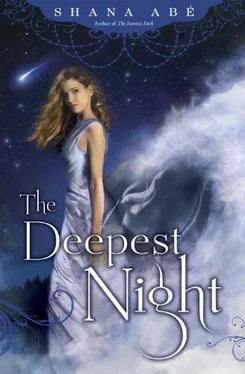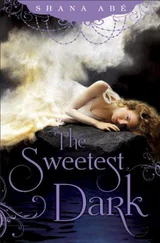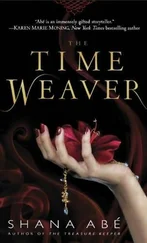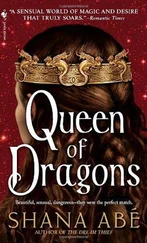The Deepest Night
The Sweetest Dark - 2
by
Shana Abe
I’m not a ghost. I am dead, though.
My body lies in its casket underneath the pale sandy sod and wind-scrubbed grass of southern England, not far from where I was born. The marker for my grave looks much like all the others in the cemetery, plain gray stone, chiseled edges. Chiseled letters spelling out my name and significant dates, and a single phrase beneath all that about the salvation of hope.
Most visitors to the cemetery walk by it without a second glance; they have memories of their own dead clouding their minds. If anything, they might make note of my age when I perished—seventeen—and feel a hint of fresh sadness whisper by, thinking something like Poor lad , or Tsk! His poor mum .
Seventeen is young to most of them. Seventeen is a short sigh of years, barely time enough to taste the bitter joy of life, the ashen loss of death. Seventeen reminds them uncomfortably well of how their own years are ticking down to a final, finite number.
But again, most people don’t bother to look or figure the math. And with the Great War still raging on, the death of a young man isn’t nearly as notable as it used to be, even in the countryside. It’s an old cemetery laid out along a hill above an even older fishing village, and mine is just one more grave amid all the generations of others.
On the surface, that is.
Three feet straight out from the front of my marker and seven inches more straight down into the dirt—curiously enough, directly above my face, although I’m fairly certain that was coincidence—is buried a flower.
It’s a buttercup, and it’s made of solid gold.
I should know. I’m the one who made it, back in my mortal life. I used my earthly magic to transform it from a living thing into a golden dead one, and I gave it to the girl I loved, who has now given it back to me. In her own way.
I’m not a ghost. I am a star. I spin a celestial magic now high, high above her, waiting for her to take notice and hear me.
Because she’s not a girl, really.
Actually, not at all.
She’s a dragon.
Poor lass. She only just found that out.
From: Mrs. Charles Westcliffe, headmistress, Iver son School for Girls
To: Mr. H. W. Forrester, former director, Blisshaven Foundling Home
May 18, 1915
Sir,
I hope this letter finds you in fine health and your new state of affairs satisfactory. I wish to express again my condolences for the loss of the Blisshaven Foundling Home. No doubt it was an excellent institution, and the orphaned children of the British Empire were privileged indeed to have found shelter there during its eighty-four years of existence. It was with great dismay that I learned of its destruction in a German air raid. Thank goodness for the government’s decision to evacuate London’s vulnerable young residents months before.
Perhaps you’ve heard that we also have had a brush with the kaiser’s dreadful zeppelins! Happily, the school remains unscathed and my charges unharmed.
However, I am writing once again to inquire as to the summer circumstances of the pupil you sent me, Miss Eleanore Jones. I fear I must point out that this is my third letter to you regarding her, and I still await your response. Her schedule simply must be sorted soon. The summer holiday is approaching and she absolutely cannot remain at the school during this time, as it will be closed but for a small skeleton staff.
There is also, frankly, the question of whether it will be suitable for Miss Jones to return for her final academic year with us at all. Although her marks have proven adequate and her unexpected musical gifts were a welcome surprise, she is, if you’ll forgive the expression, rather a fish out of water here.
I realize this news will cause you no undue astonishment. Her history as an orphan of unknown origins was certain to set her apart from the other young women in attendance, all of whom descend from the most prominent families of the empire. Her year spent involuntarily confined to the Moor Gate Institute for Socially Afflicted Youth (although maintained as a strict secret between me and select members of my staff, I assure you!) has indubitably only enhanced these differences.
Miss Jones has made few friends and garnered what I might charitably call the unlikely attention of a particular young man of noble blood. It is a relationship that is entirely inappropriate and rife with unfortunate possibilities. I’m sure you understand.
To be very blunt, our patron, the Duke of Idylling, is no longer in residence at his manor nearby. His situation remains delicate, and thus far I have been unable to ascertain if he wishes to continue the scholarship for Miss Jones. I do not believe that his son, the Marquess of Sherborne, has the proper authority to decide her case, despite what he claims.
Kindly inform me of where to send this child come June.
Most sincerely,
Mrs. C. Westcliffe
Headmistress, Iverson
Once there were dragons everywhere. Knit from the bones of the earth and the glory of the heavens, they hovered in the Divide, that thin wedge of existence that separates feral, untamed magic from safe, tamed lives.
They glistened metallic bright, thin as whips and swift as lightning. They scored the skies with wings and claws but walked on land as well, able to assume the shape of their mortal enemies—humans—when they wished. To live among them in human disguise.
They called themselves the drákon .
They hunted and fed. They wed and bred. Throughout history, human and drákon destinies entwined, but it was only humans who scribbled down the tales: about how dragons devoured crops or babies or virgins (one French anecdote I read swore they preferred truffles) and apparently were never quite smart enough to avoid being hacked to death by blokes in shining armor.
Then the drákon vanished. Just like that. Extinction came and ate them up like they were even more delicious than a virgin carrying a baby carrying a truffle though a wheat field.
Or so I surmised. Because as far as I could tell, there were only two of us left in this great and awful year of 1915, and ruddy little information to be found about even us two. Up until a short while ago, we both thought we were as human as anyone else.
But no.
There was me: Eleanore Jones, orphaned, impoverished, a slum girl scholarship student from the ghettos of London somehow improbably attending the prestigious Iverson School for Girls.
And the other, a boy as opposite my guttersnipe background as could be: Lord Armand Louis, the Most Honorable Marquess of Sherborne.
For a few short days and nights of my life, there had been Jesse, too. He wasn’t a dragon. He was much, much more dazzling than that.
But I couldn’t think about him yet.
Not yet.
So this is what you need to know first:
Ages ago off the wild and jagged coast of Wessex, England, a stubborn fist of limestone and forest eroded from the mainland to become an island with no name. An island that sometimes wasn’t even an island.
When the moon pulled just so, the island would shrink, surrounded by the blue salty waters of the Channel.
When the moon let go, the isle grew dry again, a mountain sitting on golden sand.
Ages after that, someone thought to build a castle upon it. The warlords then needed constant eyes to keep watch over the boats and tides, to stave off invasion by the barbarians who dwelled just across the sea.
Читать дальше












